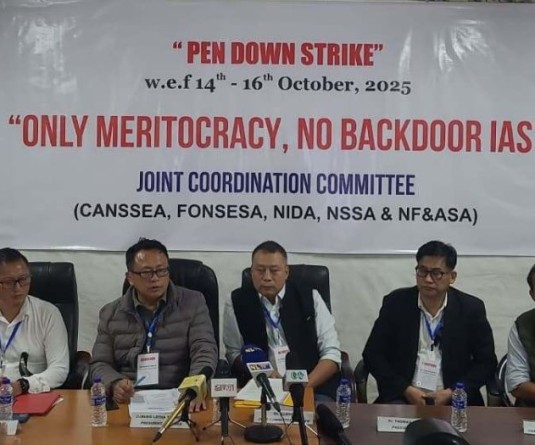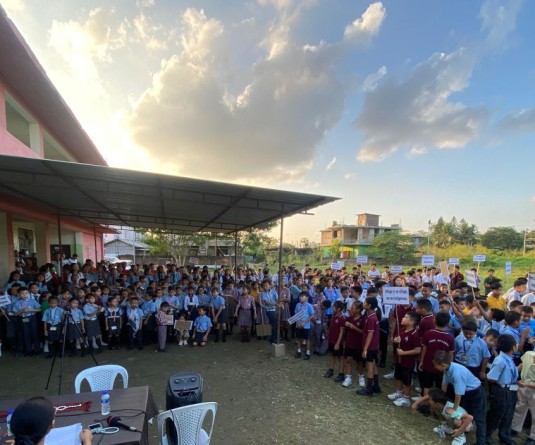Shanavas speaking at the State Level Orientation and Sensitization on NEP-The Lighthouse (NECTAR) at Hotel Vivor, Kohima on October 12. (Morung Photo)
.jpg)
Our Correspondent
Kohima | October 12
Nagaland School Education Principal Director Shanavas C today said that the implementation of Nagaland Education Project – The Lighthouse- Nagaland Enhancing Classroom Teaching and Resources (NECTAR) started from April 7, 2021.
The project is for a period of five years, which will continue till 2026, he said while speaking at the State Level Orientation and Sensitization on NEP-The Lighthouse (NECTAR) here at Hotel Vivor in the presence of KT Sukhalu, advisor school education.
Shanavas, who is also Project Director, NEP – The Lighthouse (NECTAR) informed that the World Bank has approved a $68 million for this project.
He sought the participation of the community for effective implementation of the project.
About Nagaland Education Project- The Lighthouse
With the support from World Bank, the Department of School Education Nagaland launched Nagaland Education Project - The Lighthouse - (NECTAR) to improve and enhance quality education and learning outcomes of government schools in Nagaland.
This project envisages to directly benefit around 1,50,000 students in government schools in Nagaland, 20,000 teachers including school heads, 100 District and Sub-District officers, members of 2000 SMC/SMDCs.
The NEP - The Lighthouse is a project that will breathe new life into the education system of the state, providing greater opportunities for students and teachers to realize their potential, the school education department stated.
The education system in Nagaland faces several challenges, as ultimately reflected in the decline of its student learning outcomes measured by the National Achievement Surveys (NAS).
Through this initiative, the state government is committed to prioritize and focus its efforts on addressing three precisely targeted problems within a fixed project direction.
It aims to enhance the governance of school across the state, improvement in teaching practices and enhancement of overall learning environment.
Improving system and school management
The first component will seek to focus on strengthening and improving the school management systems through increasing efficiency and implementing technology wherever possible to bridge gaps.
It aim to strengthen the overall Education Management Information System (EMIS) of the state to enhance service delivery, increasing the use of technology to improve teaching and learning, strengthening of school leaving certificate examination and strengthening governance and capacity building systems for service providers and clients.
Enhanced teaching and learning environments
This component seeks to provide a roadmap for school improvement and enhance the teaching and learning environment, including but not limited to classrooms and the context in which students learn.
It will also look beyond to encompass the entire school, including its physical and non-physical characteristic.
The project component also focuses on enhancing the learning environment through a holistic approach encompassing the entire learning arena from the curriculum and schools to the teachers and students as well.
Technical assistance
This component will finance ongoing monitoring. Impact evaluation and third party assessments of project activities and outcomes; undertake immediate COVID-19 response measures, and support enabling activities such as communication and capacity building of the state level institutions for effective implementation and efficient resourcing, implementation and sustainability of the project.
The project components are expected to pilot several innovations in teacher managements, community-accountability, and improving classroom transactions.
The project will develop and implement innovative models for technology integration, decentralized management of education systems and community driven accountability mechanisms.
Earlier, Kevileno Angami, Special Secretary to School Education, Nagaland and Vice Chairman, Project Steering Committee, NEP-The Light House delivered opening remarks.
Through virtual, Kanchan Rajeevsingh Parmar, social specialist World Bank talked on ESS while Visato Koso, project coordinator NEP touched on ESMF.
Avelu Ruho, Deputy Project Director, NEP shared the project update. Imnuksungla Pongen, Project Associate, NEP chaired the programme while vote of thanks was proposed by Neiketulie Namdau, Project Associate, NEP.






